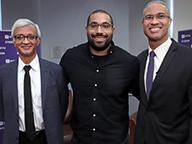Faculty News
—
Professor J.P. Eggers discusses the potential regulation of Facebook
—

Excerpt from Nightly Business Report -- "I think the recognition that there's obviously been this, as Ms. Sandberg said, breach of trust and the implications that the government and policy makers may want to weigh in on that and the implications of that. I think this becomes a real question: can Facebook help to... co-create the regulations that might be put in place that would govern some degree of control over both advertising and the management of social media online? To me the real question is how deep those regulations would actually go if they were to be put in place and how enforceable they would be..."
Faculty News
—

Excerpt from Nightly Business Report -- "I think the recognition that there's obviously been this, as Ms. Sandberg said, breach of trust and the implications that the government and policy makers may want to weigh in on that and the implications of that. I think this becomes a real question: can Facebook help to... co-create the regulations that might be put in place that would govern some degree of control over both advertising and the management of social media online? To me the real question is how deep those regulations would actually go if they were to be put in place and how enforceable they would be..."






















